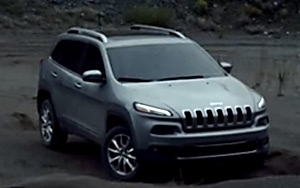 January is traditionally the slowest auto sales month of the year. Add a polar vortex or two, or three, plus a wan stock market, and you've got -- if not a perfect storm -- at least some really icy
roads for autos.
January is traditionally the slowest auto sales month of the year. Add a polar vortex or two, or three, plus a wan stock market, and you've got -- if not a perfect storm -- at least some really icy
roads for autos.
Ford and General Motors saw sales fall. General Motors saw a 10% decline in retail sales with total sales -- inclusive of fleet -- sliding 12%.
Kurt McNeil, General Motors’ U.S. VP of sales, said in a statement that the company is gearing up for several launches this year, including the Chevy Colorado mid-sized pickup, and
will accelerate brand-building and focus on pickup trucks with "larger cabs, more features and advanced technology.”
He said the automaker will focus on the NCAA March
Madness/Final Four basketball tournament and an experiential program for Chevrolet Silverado called “Hand’s-On” going to 100 markets this year, with 21 events scheduled for the first
quarter.
advertisement
advertisement
Ford saw sales drop 7%, with retail down 5%, which John Felice, VP marketing sales and service for the U.S., attributed to mucked-up weather in key markets. “In areas
where the weather was good, such as in the West, sales were up. The poor weather also had an impact on the timing of some of our fleet deliveries."
Lincoln saw sales up 43%, with
5,973 vehicles sold in January. Ford says it was the best performance for the month in four years, driven by the MKZ sedan and MKX .
Toyota posted a 7.2% decrease versus
January last year, with the company putting the finger on weather as well. Honda posted a 2% decrease between Honda and Acura.
Hyundai Motor America came in with essentially flat
sales, although it just nicked its best-ever January. "January was a bit of a challenge due to weather issues across the country, making us wonder how many more units we could have sold," said Bob
Pradzinski, VP, national sales, in a statement.
Chrysler’s Jeep brand drove the best January in six years. The automaker posted an 8% increase versus the month last
year, thanks to Cherokee, which accounted for over 10,000 vehicles delivered in January, although it had zero sales in January last year as it didn’t exist.
Fiat sales were
flat, if one doesn't include the new 500L, which, like Cherokee benefitted from having had a "zero" on the January 2013 ledger. Dodge sales, meanwhile, were off 19%.
Jesse Toprak,
head of industry analysis at Cars.com, tells Marketing Daily that one’s eye should be on the stock ticker as much as on the thermometer. "I believe what happened was as much a result of
the stock market. While the cold hurt sales, so did the over 500-point drop in the Dow."
He argues that the drop in stock prices hurt sales of more expensive cars, which have driven
sales in recent months, as consumers had shelled out for up-featured vehicles.
Toprak also notes that transaction prices also fell for the first time in 15 months, plummeting
$800, which is dramatic. “It isn't that consumers can't get as much money out of the stock market to buy a car, but that the market has a psychological effect: people are holding back on a
decision to make make big-ticket purchases."
He says Nissan, which posted an 11.8% increase in sales, got help from increased incentives in January, although Nissan division
has posted month over month sales increases for most of the last 11 months.